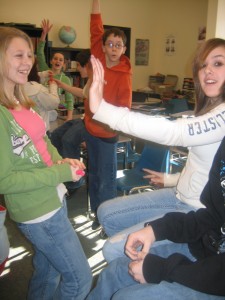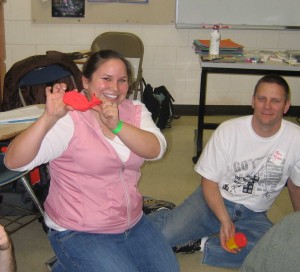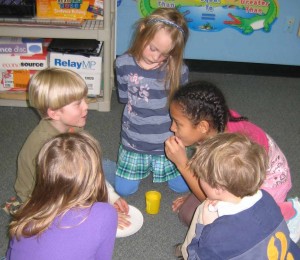
Oct 02, 2014 Cultivating Creativity
Excerpt from the new book: Inspired Educator, Inspired Learner
Play Dough Pictionary is one of my favorite community building and academic review activities. One of the reasons it stays on the top of my list is that it has led to many meaningful discussions about creativity. After playing the game, I will often ask the group to share one word to describe the activity. The words imagination and creativity come up regularly. When I ask participants “How many of you consider yourselves creative?” something interesting happens. When I ask the question of 3rd graders almost everyone raises their hand. When I ask the same question of 8th graders, high school students or adults, very few do.
Children will give many examples of using creativity whether it is in making up a game, working out a conflict with a friend, or building a fort. Older students or adults will often only refer to artistic ability. When asked why they didn’t raise their hands they will say something like, “Well I am not a good artist.”
This is a great opportunity to explore the true definition of creativity and help them reflect on examples in their day-to-day life when they ARE creative. These examples of creativity have a wide range (e.g., figuring out a way to effectively work out a conflict with a peer or family member, finding a way to fix something when they don’t have “right” tools, making an argument to persuade their parents to see something their way, writing a paper in English, working out a system for keeping group members accountable in a group project). I try to help learners realize that everyone has the ability to be creative, and that it is a skill that can be practiced.
Creativity:
The ability to make new things or think of new ideas. The ability to produce something new through imaginative skill, whether a new solution to a problem, a new method or device, or a new artistic object or form. The term generally refers to a richness of ideas and originality of thinking.
Synonyms: cleverness, ingenuity, inventiveness, originality, imagination, innovation,
Cultivating Creativity
– Merriam Webster Online Dictionary
Dr. Jonathan Plucker a leader in the study of creativity and learning from Indiana University defines creativity as “the production of original, useful things.” (Wirthy, 2002).
One of my strongest reasons for promoting experiential approaches to teaching and group work is that they promote creativity and creative problem-solving skills. Creativity in my view is one of the most important life skills. Proponents of the 21st century skills movement would argue one of the top skills necessary to thrive in the 21st century workplace.

Fifty years ago E. Paul Torrance pioneered the Torrance Test of Creative Thinking. In longitudinal studies that followed, there was a strong correlation between high scorers on this test and their success and accomplishments as adults. When Jonathan Plucker reanalyzed the data in 1999, the correlation to lifetime creative accomplishment was more than three times stronger for childhood creativity than childhood IQ. (Bronson & Merryman, 2010).
As educators we can cultivate creativity in learners by engaging them in insightful problem-solving tasks, giving them opportunities to experiment, collaborate, explore, make metaphors take ownership over their learning, take risks in learning, and by asking more questions than giving answers. Find ways to intentionally structure opportunities for inquiry, exploration, creating meaning from metaphor. Educators cultivate creativity when they are willing to go with the flow of lessons being created by their students and take advantage of unplanned opportunities for learning that arise.
When your group takes and activity or discussion somewhere unexpected, be flexible enough to go with it if appropriate. Being open to these opportunities and knowing how to guide them is one of the qualities that makes for a successful educator. Nurturing creativity in learners is what experiential education is all about.





No Comments